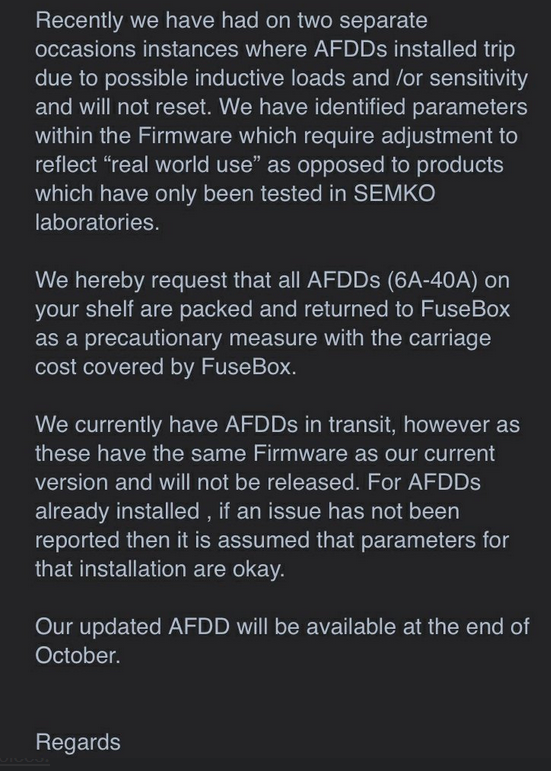How are people tacking AFDD tripping?
In the past if I had a call out for a tripping RCD/RCBO or MCB there are well established procedures and tools to track down the fault.
These range from the visual inspection, insulation resistance testing, earth leakage measurement, RCD ramp testing and RCD time testing. It would not take too long to track down the fault whether it was faulty appliance, water ingress, damaged cable or even a duff protective device. The repair might have taken a bit longer but at least you knew where the fault was.
I had a call out this weekend for a AFDD that was tripping on a ring circuit. The new consumer unit (with 3- AFDDs, RCBOS and surge protection) has been in service the end of November and no issues reported. The customer did his own diagnosing and suspected the fridge/freezer as the circuit stopped tripping when he removed the appliance from the circuit. However, when he plugged the fridge/freezer in to another ring circuit with AFDD protection via a extension lead on a reel it did not trip. At this point I did not know what type of fault it was as the customer did not make a note of LED status on the AFDD.
The fridge has no damage and continuity and insulation resting testing all OK
Ring circuit was intact and insulation testing OK (greater than 500Mohm). The instrument readings were exactly the same as they were at the end of November. Plugged it back in and no tripping. I also ran a 1.8kW load on the same socket for a few minutes to see if I could get it to trip - all OK.
Ten minutes after leaving the circuit tripped, I returned and from the flashing light sequence on the AFDD it was definitely an ARC fault. Reset the breaker and is was tripping regularly every few minutes.
I plugged in the fridge into another circuit, but this time with my much shorter extension lead. Then proceeded to inspect all sockets and checking tightness of terminals - no issues. Although there are some terminations not accessible for inspection.
Then I noticed the other circuit tripped (with fridge connected via extension lead) - so the conclusion that it is definitely the fridge. As the fridge/freezer is still under warrantee I advised the customer to contact the manufacturer. He plugged it into the original circuit in the hope to keep it running. It did not and I told him again to not run the fridge.
Later that night I get a message that now the other circuit is tripping every time they use the microwave - not the circuit with the fridge and apparently fridge not plugged in.
At the moment I am not 100% sure it is the fridge and can't rule out a faulty AFDD or has the faulty fridge caused the microprocessor in the AFDD to go faulty.
As a last resort I told them to switch off all circuits and main-switch and then switch-on one by one. Thinking that these devices have microprocessors maybe they need a restart every now and again - bit like my router at home.
Any suggestions on diagnosing ARC faults?

